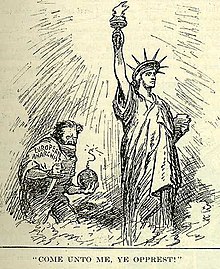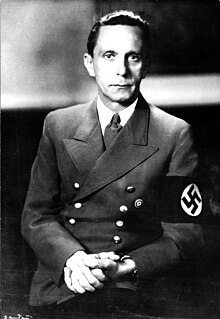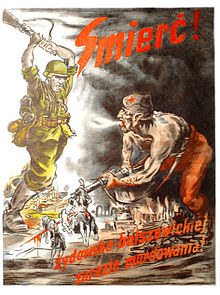Propaganda
Appearance
(Redirected from Propagandist)

Propaganda is communication that is primarily used to influence or persuade an audience to further an agenda, which may not be objective and may be selectively presenting facts to encourage a particular synthesis or perception, or using loaded language to produce an emotional rather than a rational response to the information that is being presented.
A
[edit]
- We are told, that in Turkey, when any Man is the Author of Notorious Falsehoods, it is usual to blacken the whole Front of his House. Nay we have sometimes heard, that an Embassador, whose Business it is (if I may quote his Character in Sir Henry Wotton's Words) to lie for the Good of his Country, has sometimes had this Mark set upon his House; when he been detected in any Piece of feign'd Intelligence, that has prejudiced the Government, and misled the Minds of the People. One could almost wish that the Habitations of such of our own Countrymen as deal in Forgeries detrimental to the Public, were distinguished in the same Manner; that their Fellow-Subjects might be cautioned not to be too easy in giving Credit to them. Were such a Method put in Practice, this Metropolis would be strangely checquered; some entire Parishes would be in Mourning, and several Streets darkened from one End to the other.
- Joseph Addison, The free-holder: or political essays, (1716)
- Manipulations of opinion, insofar as they are inspired by well-defined interests, have limited goals; their effect, however, if they happen to touch upon an issue of authentic concern, is no longer subject to their control and may easily produce consequences they never foresaw or intended.
- Hannah Arendt, Eichmann in Jerusalem (1963), Postscript to the revised (1965) edition
- Propaganda is a monologue that is not looking for an answer, but an echo.
- W. H. Auden, A Short Defense of Poetry (October 1967)
B
[edit]- If we understand the mechanism and motives of the group mind, is it not possible to control and regiment the masses according to our will without their knowing about it? The recent practice of propaganda has proved that it is possible, at least up to a certain point and within certain limits.
- Edward Bernays, Propaganda (1928)
- The conscious and intelligent manipulation of the organized habits and opinions of the masses is an important element in democratic society. Those who manipulate this unseen mechanism of society constitute an invisible government which is the true ruling power of our country.
- Edward Bernays, Propaganda (1928), p. 10
- We are governed, our minds are molded, our tastes formed, our ideas suggested, largely by men we have never heard of. ... In almost every act of our daily lives, whether in the sphere of politics or business, in our social conduct or our ethical thinking, we are dominated by the relatively small number of persons ... who understand the mental processes and social patterns of the masses. It is they who pull the wires which control the public mind.
- Edward Bernays, Propaganda (1928), p. 10
- No serious sociologist any longer believes that the voice of the people expresses any divine or specially wise and lofty idea. The voice of the people expresses the mind of the people, and that mind is made up for it by the group leaders in whom it believes and by those persons who understand the manipulation of public opinion. It is composed of inherited prejudices and symbols and clichés and verbal formulas supplied to them by the leaders.
- Edward Bernays, Propaganda (1928)
- Propaganda is the executive arm of the invisible government.
- Edward Bernays, Propaganda (1928)
- The engineering of consent is the very essence of the democratic process, the freedom to persuade and suggest.
- Edward Bernays, "The Engineering of Consent", Annals of the American Academy of Political and Social Science No. 250 (March 1947)
- Goebbels ... was using my book Crystallizing Public Opinion as a basis for his destructive campaign against the Jews of Germany. This shocked me.
- Edward Bernays, Biography of an Idea: Memoirs of Public Relations Counsel (1965)
C
[edit]


- The twentieth century has been characterized by three developments of great political importance: the growth of democracy, the growth of corporate power, and the growth of corporate propaganda as a means of protecting corporate power against democracy.
- Alex Carey, Taking the Risk Out of Democracy: Corporate Propaganda versus Freedom and Liberty (1995), p. 18
- The success of business propaganda in persuading us, for so long, that we are free from propaganda is one of the most significant propaganda achievements of the twentieth century.
- Alex Carey, Taking the Risk Out of Democracy: Corporate Propaganda versus Freedom and Liberty (1995), p. 21
- One reason that propaganda often works better on the educated than on the uneducated is that educated people read more, so they receive more propaganda. Another is that they have jobs in management, media, and academia and therefore work in some capacity as agents of the propaganda system--and they believe what the system expects them to believe. By and large, they're part of the privileged elite, and share the interests and perceptions of those in power.
- Noam Chomsky in Propaganda, American-style, ZPub (1987)
- For those who stubbornly seek freedom around the world, there can be no more urgent task than to come to understand the mechanisms and practices of indoctrination. These are easy to perceive in the totalitarian societies, much less so in the propaganda system to which we are subjected and in which all too often we serve as unwilling or unwitting instruments.
- Noam Chomsky in Propaganda, American-style, ZPub (1987)
- [In] democratic societies … the state can't control behavior by force. It can to some extent, but it's much more limited in its capacity to control by force. Therefore, it has to control what you think. … One of the ways you control what people think is by creating the illusion that there's a debate going on, but making sure that that debate stays within very narrow margins. Namely, you have to make sure that both sides in the debate accept certain assumptions, and those assumptions turn out to be the propaganda system. As long as everyone accepts the propaganda system, then you can have a debate.
- State propaganda, when supported by the educated classes and when no deviation is permitted from it, can have a big effect. It was a lesson learned by Hitler and many others, and it has been pursued to this day.
- Propaganda is to a democracy what the bludgeon is to a totalitarian state.
- Noam Chomsky, Interview on WBAI, January 1992
- But perhaps we are wrong. Perhaps our memory deceives us. Dr. Goebbels and his Propaganda Machine have their own version of what happened twenty-five years ago. To hear them talk, you would suppose that it was Belgium that invaded Germany! There they were, these peaceful Prussians, gathering in their harvests, when this wicked, Belgium – set on by England and the Jews – fell upon them; and would no doubt have taken Berlin, if Corporal Adolf Hitler had not come to the rescue and turned the tables. Indeed, the tale goes further. After four years of war by land and sea, when Germany was about to win an overwhelming victory, the Jews got at them again, this time from the rear. Armed with President Wilson’s Fourteen Points they stabbed, we are told, the German armies in the back, and induced them to ask for an armistice, and even persuaded them, in an unguarded moment, to sign a paper saying that it was they and not the Belgians who had been the ones to begin the War. Such is history as it is taught in topsy-turvydom. And now it is holiday again, and where are we now? Or, as you sometimes ask in the United States – where do we go from here?
- Winston Churchill, A Hush Over Europe, 8 August 1939
D
[edit]- The easiest way to inject a propaganda idea into most people’s minds is to let it go through the medium of an entertainment picture when they do not realize that they are being propagandized.
- Elmer Holmes Davis as quoted in Hollywood Goes to War: How Politics, Profits and Propaganda Shaped World War II Movies by Clayton R. Koppes and Gregory D. Black (Berkeley: University of California Press, 1990) p. 64.
E
[edit]
- Through the myth it creates, propaganda imposes a complete range of intuitive knowledge, susceptible of only one interpretation, unique and one-sided, and precluding any divergence. This myth becomes so powerful that it invades every arena of consciousness, leaving no faculty or motivation intact. It stimulates in the individual a feeling of exclusiveness, and produces a biased attitude.
- Jacques Ellul, in Propaganda: The Formation of Men's Attitudes (1962), as translated by Konrad Kellen & Jean Lerner (1965)
- Modern propaganda is based on scientific analyses of psychology and sociology. Step by step, the propagandist builds his techniques on the basis of his knowledge of man, his tendencies, his desires, his needs, his psychic mechanisms, his conditioning — and as much on social psychology as on depth psychology. He shapes his procedures on the basis of our knowledge of groups and their laws of formation and dissolution, of mass influences, and of environmental limitations. Without the scientific research of modern psychology and sociology there would be no propaganda, or rather we still would be in the primitive stages of propaganda that existed in the time of Pericles or Augustus.
- Jacques Ellul, in Propaganda: The Formation of Men's Attitudes (1962), as translated by Konrad Kellen & Jean Lerner (1965), p. 4
- The most favorable moment to seize a man and influence him is when he is alone in the mass. It is at this point that propaganda can be most effective.
- Jacques Ellul, in Propaganda: The Formation of Men's Attitudes (1962), as translated by Konrad Kellen & Jean Lerner (1965), p. 9
- Propaganda does not aim to elevate man, but to make him serve.
- Jacques Ellul, in Propaganda: The Formation of Men's Attitudes (1962), as translated by Konrad Kellen & Jean Lerner (1965), p. 38
- Hate, hunger, and pride make better levers of propaganda than do love or impartiality.
- Jacques Ellul, in Propaganda: The Formation of Men's Attitudes (1962), as translated by Konrad Kellen & Jean Lerner (1965), p. 38
- We can now advance a definition of propaganda — not an exhaustive definition, unique and exclusive of all others, but at least a partial one: Propaganda is a set of methods employed by an organized group that wants to bring about the active or passive participation in its actions of a mass of individuals, psychologically unified through psychological manipulations and incorporated in an organization.
- Jacques Ellul, in Propaganda: The Formation of Men's Attitudes (1962), as translated by Konrad Kellen & Jean Lerner (1965), p. 61
- There remains the problem of Goebbels' reputation. He wore the title of Big Liar (bestowed by Anglo-Saxon propaganda) and yet he never stopped battling for propaganda to be as accurate as possible. He preferred being cynical and brutal to being caught in a lie. He used to say: "Everybody must know what the situation is." He was always the first to announce disastrous events or difficult situations, without hiding anything. The result was a general belief between 1939 and 1942 that German communiqués not only were more concise, clearer and less cluttered, but were more truthful than Allied communiqués (American and neutral opinion) — and, furthermore, that the Germans published all the news two or three days before the Allies. All this is so true that pinning the title of Big Liar on Goebbels must be considered quite a propaganda success.
- Jacques Ellul, "The Characteristics of Propaganda" in Readings in Propaganda and Persuasion: New and Classic Essays edited by Garth S. Jowett and Victoria O'Donnell, (SAGE, 2006) p. 48, note 47

F
[edit]- Both Superpowers used propaganda to penetrate their enemy’s territory. From the Kremlin came torrents of upbeat economic reports and antifascist diatribes as well as attacks on Western racism, capitalism, warmongering, and imperialism, which were echoed by Communist Party leaders and adherents in the West. The other side sent radio broadcasts in the national languages of Eastern Europe from the Voice of America, Radio Free Europe, and the BBC with news from the outside world, encouraging the “captive populations” to seek freedom from Moscow’s domination.
- Carole C. Fink, The Cold War: An International History, p. 90
G
[edit]- We use the term “junk news” to include various forms of propaganda and ideologically extreme, hyperpartisan, or conspiratorial political news and information. Much of this content is deliberately produced false reporting. It seeks to persuade readers about the moral virtues or failings of organizations, causes or people and presents commentary as a news product...[using] ad hominem attacks, emotionally charged words and pictures, unsafe generalizations and other logical fallacies.
- John D Gallacher et al. in "Junk News on Military Affairs and National Security: Social Media Disinformation Campaigns Against US Military Personnel and Veterans" Oxford Democracy and Technology Programme (October, 2017)
- Scientifically regarded, propaganda is merely a form of mental suggestion.
- Edward Glover, The Psychology of Fear and Courage (Harmondsworth: Penguin, 1940), p. 52
- All effective propaganda must be limited to a very few points and must harp on these in slogans until the last member of the public understands.
- Joseph Goebbels quoted by Zachary Jonathan Jacobson in Many are worried about the return of the 'Big Lie.' They're worried about the wrong thing . The Washington Post, 21 May 2018
- Of course the people don’t want war. But after all, it’s the leaders of the country who determine the policy, and it’s always a simple matter to drag the people along whether it’s a democracy, a fascist dictatorship, or a parliament, or a communist dictatorship. Voice or no voice, the people can always be brought to the bidding of the leaders. That is easy. All you have to do is tell them they are being attacked, and denounce the pacifists for lack of patriotism, and exposing the country to greater danger.
- Herman Goering at the Nuremberg trials
- Pope Gregory XV made a new start by setting up in 1622 the Sacred Congregation for the Propagation of the Faith... The new Congregation was supposed to supervise the missions and coordinate their activities. In due course, it came to be known as Propaganda from its Latin name — Propaganda di Fide. An otherwise innocent word was to acquire a bad odour in succeeding centuries because of its association with Popery. Though this department is still an integral part of the Pope's establishment at Rome, it has been renamed the Sacred Congregation for Evangelisation of Peoples. The shame which this set-up has brought upon the Pope by its close cooperation with Western imperialism for four-and-a-half centuries, is being sought to be hidden by a bit of linguistic surgery.
- About the history of the word 'propaganda'. Sita Ram Goel (1986). Papacy: Its doctrine and history, p. 71
H
[edit]
- Propaganda must be limited to a few simple themes and these must be represented again and again. Here, as in innumerable other cases, perseverance is the first and most important condition of success.
- Variant: No amount of genius spent on the creation of propaganda will lead to success if a fundamental principle is not forever kept in mind. Propaganda must confine itself to very few points, and repeat them endlessly. Here, as with so many things in this world, persistence is the first and foremost condition of success.
- Adolf Hitler, in Mein Kampf (1925) ; translated to English by James Murphy (February 1939)
- In the big lie there is always a certain force of credibility; because the broad masses of a nation are always more easily corrupted in the deeper strata of their emotional nature than consciously or voluntarily; and thus in the primitive simplicity of their minds they more readily fall victims to the big lie than the small lie, since they themselves often tell small lies in little matters but would be ashamed to resort to large-scale falsehoods. It would never come into their heads to fabricate colossal untruths, and they would not believe that others could have the impudence to distort the truth so infamously.
- Adolf Hitler, ''Mein Kampf, Chapter 9, (1925)
- We tend today to exaggerate the effectiveness of persuasion as a means of inculcating opinion and shaping behavior. ...Actually the fabulous effects ascribed to propaganda have no greater foundation in fact than the fall of the walls of Jericho ascribed to the blast of Joshua's trumpets.
- Eric Hoffer, The True Believer (1951) Ch.14 Unifying Agents, §83
- Russians might not believe official media, but might also choose — perhaps subconsciously — not to acknowledge the extent to which they allow themselves to be deceived. (It bears mentioning that social media analysts of the 2016 US presidential election noted a similar phenomenon: Citizens can, and often do, choose to believe comfortable falsehoods, instead of admitting to truths that disrupt their desired way of seeing the world.) Looking at Russian television news after the takeover of Crimea in 2014, journalist Maria Lipman concluded that the more extreme and far-fetched the claims of various programs became, the more their audiences grew. “Russian viewers tuned into shows,” she and two colleagues argued in a 2018 essay, “in search of not truth, but emotional gratification.” Viewers wanted to believe wildly distorted media stories that affirmed “national pride and a sense of vindication.”
- All war propaganda consists, in the last resort, in substituting diabolical abstractions for human beings. Similarly, those who defend war have invented a pleasant sounding vocabulary of abstractions in which to describe the process of mass murder.
- Aldous Huxley, in "Pacifism and Philosophy" (1936)
- The propagandist's purpose is to make one set of people forget that certain other sets of people are human.
- Aldous Huxley, The Olive Tree (1937). New York: Harper & Brothers, p. 101
K
[edit]- Highly intelligent people hate to admit they have fallen for such propaganda, and often get angry when it is suggested to them that they have.
- Tony Kevin, Ukraine shrinks again, in Pearls and Irritations:John Menadue's Public Policy Journal, Feb 23, 2022
L
[edit]
- His (Hitler's) primary rules were: never allow the public to cool off; never admit a fault or wrong; never concede that there may be some good in your enemy; never leave room for alternatives; never accept blame; concentrate on one enemy at a time and blame him for everything that goes wrong; people will believe a big lie sooner than a little one; and if you repeat it frequently enough people will sooner or later believe it.
- Walter C. Langer in Adolf Hitler: Psychological Analysis of Hitler’s Life & Legend, PDF at cia.gov, Office of Strategic Services (the intelligence agency of the United States during World War II), 1943
- What each man does is based not on direct and certain knowledge, but on pictures made by himself or given to him...The very men who most loudly proclaim their “materialism” and their contempt for “ideologues,” the Marxian communists, place their entire hope on what? On the formation by propaganda of a class-conscious group. But what is propaganda, if not the effort to alter the picture to which men respond, to substitute one social pattern for another?
- Walter Lippmann Public Opinion (1922)
- Without some form of censorship, propaganda in the strict sense of the word is impossible. In order to conduct a propaganda there must be some barrier between the public and the event. Access to the real environment must be limited, before anyone can create a pseudo-environment that he thinks wise or desirable. ...It is often very illuminating, therefore, to ask yourself how you got at the facts on which you base your opinion. Who actually saw, heard, felt, counted, named the thing, about which you have an opinion? Was it the man who told you, or the man who told him, or someone still further removed? And how much was he permitted to see?
- Walter Lippmann Public Opinion (1922)
- Photographs have the kind of authority over imagination to-day, which the printed word had yesterday, and the spoken word before that. They seem utterly real. They come, we imagine, directly to us without human meddling, and they are the most effortless food for the mind conceivable.
- Walter Lippmann Public Opinion (1922)
M
[edit]
- Propaganda is defined as the manipulation of the public to the end of securing some specific action.
- Everett Dean Martin, Are We Victims of Propaganda, Our Invisible Masters: A Debate with Edward Bernays (1929)
- Its aim is to “put something over” on people, with or without their knowledge or consent… neither truth nor the basic values of civilization get a fair hearing.
- Everett Dean Martin, Are We Victims of Propaganda, Our Invisible Masters: A Debate with Edward Bernays (1929)
- Prejudice and the well-known weaknesses of human nature are to be exploited and thus encouraged.
- Everett Dean Martin, Are We Victims of Propaganda, Our Invisible Masters: A Debate with Edward Bernays (1929)
- So long as the public may be manipulated by misrepresentation and by appeal to ignorance and prejudice, it is the public’s own fault if the “knowing ones” make use of questionable methods.
- Everett Dean Martin, Are We Victims of Propaganda, Our Invisible Masters: A Debate with Edward Bernays (1929)
- The evil effect of these attempts to manipulate the multitude by pampering its weaknesses — in return for material and other advantages to persons and for ends not disclosed — is clearly seen in various aspects of our common life. In politics such effect have long been deplorable.
- Everett Dean Martin, Are We Victims of Propaganda, Our Invisible Masters: A Debate with Edward Bernays (1929)
- It is the trivial, the irrelevant, the sensational, the appeal to obsolete bigotry which naturally give it greatest publicity. In such publicity it becomes a mere vulgar caricature of itself.
- Everett Dean Martin, Are We Victims of Propaganda, Our Invisible Masters: A Debate with Edward Bernays (1929)
- One of the serious results of propaganda is that it has caused the public to think that education and propaganda are the same thing, and thus to make an ignorant multitude believe it is being educated when it is only being manipulated. Education aims at independence of judgement. Propaganda offers ready-made opinions for the unthinking herd.
- Everett Dean Martin, Are We Victims of Propaganda, Our Invisible Masters: A Debate with Edward Bernays (1929)
- The educator aims at a slow process of development; the propagandist, at quick results. The educator tries to tell people how to think; the propagandist, what to think. The educator strives to develop individual responsibility; the propagandist, mass effects. The educator wants thinking; the propagandist, action. The educator fails unless he achieves an open mind; the propagandist, unless he achieves a closed mind.
- Everett Dean Martin, Are We Victims of Propaganda, Our Invisible Masters: A Debate with Edward Bernays (1929)
N
[edit]- The class which has the means of material production at its disposal, has control at the same time over the means of mental production.
- Karl Marx, The German Ideology (1846), p. 64


O
[edit]- Oceania was at war with Eurasia: therefore Oceania had always been at war with Eurasia. The enemy of the moment always represented absolute evil, and it followed that any past or future agreement with him was impossible...
- If the Party could thrust its hand into the past and say of this or that event, it never happened — that, surely, was more terrifying than mere torture and death? And if all others accepted the lie which the Party imposed -if all records told the same tale — then the lie passed into history and became truth.
- Who controls the past,' ran the Party slogan, 'controls the future: who controls the present controls the past. And yet the past, though of its nature alterable, never had been altered. Whatever was true now was true from everlasting to everlasting. It was quite simple. All that was needed was an unending series of victories over your own memory. 'Reality control', they called it: in Newspeak, 'doublethink'...
- George Orwell, Nineteen Eighty-Four (1949), Chapter III.
P
[edit]- In the war of propaganda it is very difficult to defeat the United States because the United States controls all the world’s media and many European media. The ultimate beneficiary of the biggest European media are American financial institutions. Don't you know that? So it is possible to get involved in this work, but it is cost prohibitive, so to speak. We can simply shine the spotlight on our sources of information, and we will not achieve results. It is clear to the whole world what happened, and even American analysts talk about it directly. It's true.
- Vladimir Putin, Interview to Tucker Carlson, 9 February 2024
R
[edit]- Propaganda is a bitter medicine. You receive the cure for your illnesses from the doctor that inoculates it under your skin, and from a needle that carefully touches important nerves of the human mind and spirit.
- Marco Respinti, "Walter Did Not Save Sarajevo", Bitter Winter (November 20, 2024)
S
[edit]- Never has the media been so influential in determining the course of war as during the Al-Aqsa Intifada, which, as far as the Western media are concerned, has essentially become a battle over images and ideas. Israel has already poured hundreds of millions of dollars into what in Hebrew is called hasbara, or information for the outside world (hence, propaganda). This has included an entire range of efforts: lunches and free trips for influential journalists; seminars for Jewish university students who, over a week in a secluded country estate, can be primed to “defend” Israel on the campus; bombarding congressmen and women with invitations and visits; pamphlets and, most important, money for election campaigns; directing (or, as the case requires, harassing) photographers and writers of the current intifada into producing certain images and not others; lecture and concert tours by prominent Israelis; training commentators to make frequent references to the Holocaust and Israel’s predicament today; many advertisements in the newspapers attacking Arabs and praising Israel; and on and on. Because so many powerful people in the media and publishing business are strong supporters of Israel, the task is made vastly easier.
- Edward Said, "Propaganda and War" (2001), published in From Oslo to Iraq and the Road Map (2004)
- Propaganda is not French, it is not civilized to want other people to believe what you believe because the essence of being civilised is to possess yourself as you are, and if you possess yourself as you are you of course cannot possess any one else, it is not your business.
- Gertrude Stein, in Paris France (1940), p. 56

T
[edit]- While few in Britain or Germany wanted a war, it is a historical fact that the mass of the people in both countries eventually tolerated one, and participated, if not with enthusiasm, then with a grim determination. This is especially true of the journey undertaken by the mass of the public in Germany, which had been deeply reluctant go to war in September 1938 over the Sudetenland, but a little less than a year later allowed itself to be persuaded that conflict with Poland was legitimate and necessary. The propaganda campaign undertaken by the Nazi regime to this end provides a near-perfect example of how, when a government exercises total control of information, an entire nation can be bent to its will.
- Frederick Taylor, 1939: A People's History (2020)
X
[edit]- The press is so powerful in its image-making role, it can make the criminal look like he's a the victim and make the victim look like he's the criminal. This is the press, an irresponsible press. It will make the criminal look like he's the victim and make the victim look like he's the criminal. If you aren't careful, the newspapers will have you hating the people who are being oppressed and loving the people who are doing the oppressing.
If you aren't careful, because I've seen some of you caught in that bag, you run away hating yourself and loving the man — while you're catching hell from the man. You let the man maneuver you into thinking that it's wrong to fight him when he's fighting you. He's fighting you in the morning, fighting you in the noon, fighting you at night and fighting you all in between, and you still think it's wrong to fight him back. Why? The press. The newspapers make you look wrong.- Malcolm X, Speech at the Audubon Ballroom in Harlem (13 December 1964), later published in Malcolm X Speaks: Selected Speeches and Statements (1965), edited by George Breitman, p. 93


